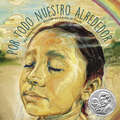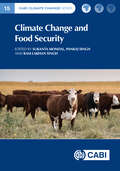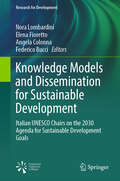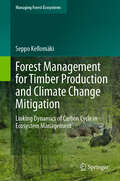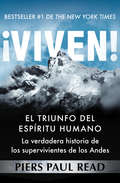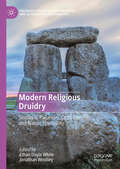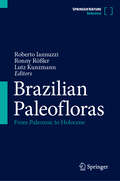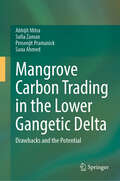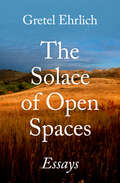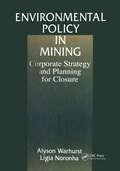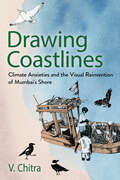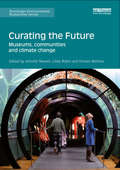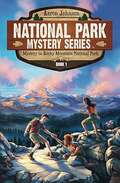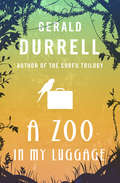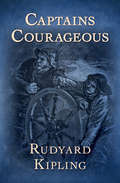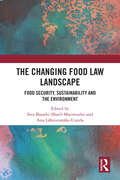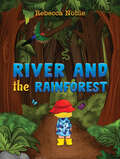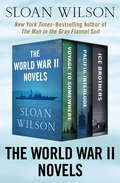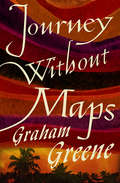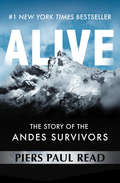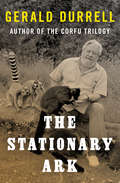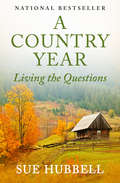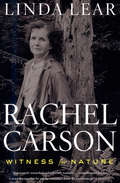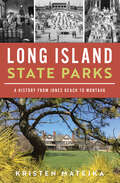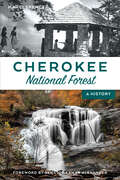- Table View
- List View
Por todo nuestro alrededor
by Xelena GonzálezAmerican Indian Youth Literature Award - American Indian Library Association Pura Belpré Illustrator Award Honor - American Library Association (ALA)Este hermoso libro ilustrado, ganador del Pura Belpré Illustrator Honor y del American Indian Youth Literature Award Picture Book Honor, celebra los círculos que nos rodean, en el cielo, la tierra, nuestros vecindarios, nosotros mismos ... si nos atrevemos a buscarlos.Abuelo y nieta meditan sobre jardines y semillas, sobre círculos visibles e invisibles, mientras participan y crean tradiciones familiares en esta hermosa exploración de los ciclos de la vida y naturaleza. La versión en inglés ganó el premio Pura Belpre Honor por Illustración en el 2018. Busque el libro complementario, Donde las maravillas crecen. Grandpa and his granddaughter meditate on gardens and seeds, and on circles seen and unseen, as they share and create family traditions in this stunning exploration of the cycles of life and nature. All Around Us received a Pura Belpre Honor Award for Illustration in 2018. Look for the companion book, Where Wonder Grows.
Climate Change and Food Security (CABI Climate Change Series)
by Edited by Sukanta Mondal, Pankaj Singh and Ram Lakhan SinghThe effects of climate change on food production and security are many and varied and represent one of the biggest challenges facing humanity today. As the human population increases there is increasing pressure on land availability and water resources. In many staple crops, warming temperatures have caused decreases in overall yields but at the same time the demand for cheaper and more sustainable food has increased. This edited volume examines the effects of climate change on all aspects of food production and how this is affecting food security in many parts of the world. The book presents a series of chapters which describe new technologies aimed at mitigating these effects via, for example, genetic modification, microbial science, and the introduction of new crops. · Information is presented in a very accessible and logical format. · The book focuses on sustainable food security and safety, illustrated with case studies. · The chapters cover the latest thinking on food security via sustainable livestock and agricultural production. · The book describes the social issues related to food safety, regulatory frameworks, and policies in the light of climate change.
Knowledge Models and Dissemination for Sustainable Development: Italian UNESCO Chairs on the 2030 Agenda for Sustainable Development Goals (Research for Development)
by Nora Lombardini Elena Fioretto Angela Colonna Federico BucciThis book delves into the invaluable contributions made by the Italian UNESCO Chairs toward addressing the intricate and pressing global challenges of our era. Established within the UNITWIN/UNESCO Chairs program initiated by UNESCO in 1992, these Chairs serve as vital links between the realms of academic research and civil society. They offer a conduit for disseminating knowledge, thereby advancing the objectives of global development. By facilitating the transfer and adoption of scientific methodologies through intellectual collaboration, they strive to enhance the sustainability and resilience of both individual communities and society at large. Through a series of dialogues, the Italian UNESCO Chairs critically examine the challenges inherent in this mission, the objectives they aim to achieve, the strategies employed in scientific research, and the development of novel areas of study. They approach these endeavors with a conscientious and responsible mindset, recognizing them as essential responses to the multifaceted issues arising in our rapidly evolving world. The contributions put forth by the Italian UNESCO Chairs serve as practical tools for the implementation of the 17 Sustainable Development Goals, making them relevant to various stakeholders. These include not only citizens, scholars, public and private institutions, research centers, and administrators but also anyone with an interest in tackling the challenges of sustainable development in our everyday lives.
Forest Management for Timber Production and Climate Change Mitigation: Linking Dynamics of Carbon Cycle in Ecosystem Management (Managing Forest Ecosystems #44)
by Seppo KellomäkiThis book introduces the complex world of carbon dynamics within forest ecosystems, particularly in boreal zones, while also incorporating findings from selected temperate areas. It explores how these dynamics are influenced by management strategies and operations, providing a comprehensive understanding of how forests can be managed to enhance carbon uptake and thus, mitigate climate change. Divided into five parts, the volume begins by addressing the characteristics of global and boreal forests and their contribution to carbon storage. The following sections explore carbon dynamics in both natural and managed forests, including their impact on forest succession. The text also examines how management practices affect carbon dynamics, tree growth, and carbon stocks. Strategies to mitigate climate change through forest management, including the management of soil carbon and reforestation efforts are discussed. Finally, topics such as pre-commercial management, commercial thinning, and forest fertilization and their roles in managing boreal forest ecosystems for carbon sequestration and climate benefits are addressed. Aimed at professionals, researchers, and students in forestry, environmental science, and climate change studies, this book provides valuable insights into developing management strategies that enhance carbon uptake and accumulation in forest ecosystems. Readers will gain a comprehensive understanding of how forest management can contribute to climate change mitigation. It is an essential resource for anyone interested in sustainable forestry practices.
¡Viven!: El triunfo del espíritu humano
by Piers Paul ReadBestseller #1 de TheNew York Times: La verdadera historia de un equipo de rugby que recurre a lo inimaginable cuando su avión se estrella en los Andes. Reinaba el buen ánimo cuando el Fairchild F-227 despegó desde Mendoza, Argentina, con rumbo a Santiago, Chile. Había cuarenta y cinco pasajeros a bordo, entre ellos un equipo de rugby amateur uruguayo y los amigos y parientes de los jugadores. El cielo estaba despejado ese viernes 13 de octubre de 1972 y, a las 15:30 de la tarde, el piloto del Fairchild anunció que se encontraban a 15.000 pies de altura. Sin embargo, un minuto después, la torre de control de Santiago perdió todo contacto con la aeronave. Chilenos, uruguayos y argentinos buscaron el avión durante ocho días pero había nevado con intensidad sobre los Andes y las posibilidades de encontrar los restos eran escasas. Diez semanas más tarde, un campesino vio a dos hombres con aspecto harapiento haciendo señas, desesperados, desde el otro lado de un río. Les tiró un pedazo de papel y un bolígrafo envueltos en un pañuelo y los hombres enseguida le devolvieron una nota que leía: &“Venimos de un avión que cayó en las montañas&”. Dieciséis pasajeros sobrevivieron. Acamparon en el fuselaje del avión en medio de la naturaleza gélida de los Andes, donde soportaron temperaturas heladas, peligrosas lesiones, una avalancha, y hambre extrema. Cuando comenzaron a acabarse las escasas provisiones de alimento y, luego de oír en la radio que habían logrado armar, que los equipos de rescate habían cesado su búsqueda, las esperanzas de los pasajeros se empezaron a desvanecer. Con el fin de salvar sus propias vidas, estos tuvieron que no sólo mantener la fe, sino que también debieron tomar una imposible decisión: comer o no la carne de sus amigos que habían muerto. Una historia de resiliencia, determinación, y el espíritu humano, ¡Viven! es un relato conmovedor de una historia de supervivencia desgarradora.
Modern Religious Druidry: Studies in Paganism, Celtic Identity, and Nature Spirituality (Palgrave Studies in New Religions and Alternative Spiritualities)
by Ethan Doyle White Jonathan WoolleyOver the past three decades, the academic study of modern Paganism has gone from strength to strength. Scholars now have access to a plethora of studies available on such new religions as Wicca, Heathenry, and the Goddess Movement - but despite its prominence, modern Druidry has been much neglected. This book seeks to change that. This volume is interdisciplinary in basis, bringing together contributions from anthropologists, historians, and scholars of religion. It fundamentally deepens collective scholastic understandings of modern religious Druidry as an actor within the broader Pagan milieu. In addition to looking at the movement in various national contexts, the volume also explores thematic topics that have largely been neglected before. It will serve as a benchmark upon which all future studies of modern Druidry, as well as modern Paganism more widely, can draw upon, thereby making a particularly important and much-needed contribution to the field.
Brazilian Paleofloras: From Paleozoic to Holocene
by Roberto Iannuzzi Ronny Rößler Lutz KunzmannThis book will cover the entire evolutionary history that the terrestrial plants have recorded in Brazilian sedimentary rocks, ranging from the first vestiges of terrestrial environments colonization about 400 million years ago, until reaching the eve of the present time, when the current vegetation formations were organizing to reach their current distribution, diversity and structure in modern biomes. At present Brazil is home to the world's greatest plant biodiversity and we aim to offer here an opportunity to appreciate how this floral biodiversity originated and developed in these lowlands of South America, through chapters elaborated by the best Brazilian paleobotanist and palynologists in collaboration with foreign experts who dedicate to elucidate the evolution of the ancient flora in this part of the planet.
Mangrove Carbon Trading in the Lower Gangetic Delta: Drawbacks and the Potential
by Abhijit Mitra Sufia Zaman Prosenjit Pramanick Sana AhmedTrue mangrove flora and their associates in the lower Gangetic region are noted for their wide spectrum of ecosystem services in which carbon storage and sequestration by the forest is one of the most important components. Many researchers are updating the carbon repository of the lower Gangetic delta mangroves with the aim to ascertain their role to reduce the carbon dioxide level of the near surface atmosphere. However, due to difficulty in assessment, marketing, and lack of clarity over ownership of natural resources, the mangrove-based carbon trading system has not yet crystallized.There is an estimated 13.76 Mha of mangrove forests world-wide, approximately 20% (2.6 Mha) of which is potentially investible for carbon finance projects, based on the probability of imminent threat. The magnitude and the variability of threats to which the mangroves of the lower Gangetic delta are exposed to have made the trading process more complicated. In addition, gaps also exist between the national government policy and the trading of the blue carbon projects, which has kept the future of such projects remain on hold. The authors put forward the views that the creation of more financial facilities for restoration and expansion of blue carbon (preferably mangroves) with the involvement of the local communities can provide the initial capital involved in developing mangrove-based carbon projects. This includes the costs of conducting feasibility studies, implementing capacity-building programs, monitoring the health of the mangrove plantation/restoration on regular basis, and creating mangrove-based alternative livelihood programs that will support island dwellers of the region in order to accelerate the magnitude of mangrove-based carbon projects leading to growth of the mangrove trading market.
The Solace of Open Spaces: Essays
by Gretel EhrlichThese transcendent, lyrical essays on the West announced Gretel Ehrlich as a major American writer—&“Wyoming has found its Whitman&” (Annie Dillard). Poet and filmmaker Gretel Ehrlich went to Wyoming in 1975 to make the first in a series of documentaries when her partner died. Ehrlich stayed on and found she couldn&’t leave. The Solace of Open Spaces is a chronicle of her first years on &“the planet of Wyoming,&” a personal journey into a place, a feeling, and a way of life. Ehrlich captures both the otherworldly beauty and cruelty of the natural forces—the harsh wind, bitter cold, and swiftly changing seasons—in the remote reaches of the American West. She brings depth, tenderness, and humor to her portraits of the peculiar souls who also call it home: hermits and ranchers, rodeo cowboys and schoolteachers, dreamers and realists. Together, these essays form an evocative and vibrant tribute to the life Ehrlich chose and the geography she loves. Originally written as journal entries addressed to a friend, The Solace of Open Spaces is raw, meditative, electrifying, and uncommonly wise. In prose &“as expansive as a Wyoming vista, as charged as a bolt of prairie lightning,&” Ehrlich explores the magical interplay between our interior lives and the world around us (Newsday).
Environmental Policy in Mining: Corporate Strategy and Planning
by Alyson Warhurst Ligia NoronhaEcological Management of Mining: Achieving Environmental Compliance is a study and comparison - global in scope - of current practices used by mining firms striving for ecological management. The author takes an integrated and interdisciplinary approach in addressing, analyzing and working towards solutions regarding the complex challenges posed by managing the environmental impacts of mining. The issues addressed range from the ecotoxicological effects of metal residues to the land use effects of mining and from socioeconomic impacts to environmental regulation. The goal of this book is to assist mining companies throughout the world to achieve environmental compliance and improve competitiveness in the context of growing environmental regulation and technological innovation. It is an essential book for the wide variety of professionals working on issues in mining. Like the book and the research itself, the audience is integrated and interdisciplinary including engineers, planners, ecologists, policy makers and economists.
Drawing Coastlines: Climate Anxieties and the Visual Reinvention of Mumbai's Shore (Expertise: Cultures and Technologies of Knowledge)
by V. ChitraDrawing Coastlines reveals the ways that technical images such as weather infographics, sea-level projections, and surveys are fast remaking Mumbai's coasts and coastal futures. They set in place infrastructural interventions, vocabularies of development and conservation, and their lines and dots inscribe material conditions of existence and horizons of loss that entangle life forms. V. Chitra interlaces graphics and text by redrawing scientific images, the moments of their construction, the choices and consequences of what gets drawn and what does not, and how images are seen, performed, and manifest. These visual reconstructions show how images remake human-nonhuman relationships, arrange urban politics, and materialize landscapes in complex and contradictory ways. The multimodal format of Drawing Coastlines engages in the politics of its context where words and images combine to create coastal worlds, and to find, through a creative anthropology, openings to build new forms of care in the midst of crisis.
Curating the Future: Museums, Communities and Climate Change (Routledge Environmental Humanities)
by Libby Robin Jennifer Newell Kirsten WehnerCurating the Future: Museums, Communities and Climate Change explores the way museums tackle the broad global issue of climate change. It explores the power of real objects and collections to stir hearts and minds, to engage communities affected by change. Museums work through exhibitions, events, and specific collection projects to reach different communities in different ways. The book emphasises the moral responsibilities of museums to address climate change, not just by communicating science but also by enabling people already affected by changes to find their own ways of living with global warming. There are museums of natural history, of art and of social history. The focus of this book is the museum communities, like those in the Pacific, who have to find new ways to express their culture in a new place. The book considers how collections in museums might help future generations stay in touch with their culture, even where they have left their place. It asks what should the people of the present be collecting for museums in a climate-changed future? The book is rich with practical museum experience and detailed projects, as well as critical and philosophical analyses about where a museum can intervene to speak to this great conundrum of our times. Curating the Future is essential reading for all those working in museums and grappling with how to talk about climate change. It also has academic applications in courses of museology and museum studies, cultural studies, heritage studies, digital humanities, design, anthropology, and environmental humanities.
Mystery in Rocky Mountain National Park (National Park Mystery Series #1)
by Aaron JohnsonSecret Codes - Lost Landmarks - Hidden Clues - Real Locations Before Jake’s grandfather died, he was on the trail of a centuries-old mystery. And he has entrusted that mystery to Jake, leaving behind a set of hidden codes, riddles, maps, and other clues that lead Jake and his friends on a scavenger hunt into the heart of Colorado’s wild and rugged Rocky Mountain National Park. Through twists and turns, the mystery unfolds while Jake, Amber, and Wes learn about survival skills, natural history, integrity, character, and friendship. While camping in Rocky Mountain National Park, they discover they are not the only ones on this quest. An elusive shadow group is close on their heels. Illustrated by the author, this page-turning adventure is designed to capture the imagination of even the most reluctant of young readers. Parents looking for a delightful read-aloud adventure will find it hard to put down. (Word of Caution: readers frequently note that this is a “Please read just one more chapter” book). If your family loves the enchanted lands of our national parks, this series will take you to hidden places and into breathtaking landscapes. If you enjoy movies like National Treasure and Uncharted or mystery adventures like the Hardy Boys and Gary Paulsen’s survival story, Hatchet, you’ll love this first installment of the National Park Mystery Series.
A Zoo in My Luggage: A Zoo In My Luggage, The Whispering Land, And Menagerie Manor (The Zoo Memoirs #1)
by Gerald DurrellA British naturalist and his wife acquire a menagerie of animals and set up their own zoo in this delightful memoir by the author of the Corfu Trilogy.For many years I had wanted to start a zoo. . . . Any reasonable person smitten with an ambition of this sort would have secured the zoo first and obtained the animals afterwards. But throughout my life I have rarely if ever achieved what I wanted by tackling it in a logical fashion. After a decade of supplying creatures for other people&’s zoos, in 1957 Gerald Durrell and his wife set off on an adventurous journey to the Cameroons in West Africa, where they collected numerous mammals, birds, and reptiles. The wild nature of the animals created quite a bit of chaos, but the Durrells&’ problems really began when they attempted to return to Britain with their exotic new friends. Not only did they have to get them safely home, they also had to find somewhere able and—more importantly—willing to house them. Told with wit and a zest for all things furry and feathered, Durrell&’s A Zoo in My Luggage is a brilliant account of how a pioneer of wildlife preservation came to found a new type of zoo. This ebook features an illustrated biography of Gerald Durrell including rare photos from the author&’s estate.
Captains Courageous: A Story Of The Grand Banks
by Rudyard KiplingThis dramatic nineteenth-century nautical adventure and classic coming-of-age story is one of Rudyard Kipling&’s most enduringly popular works. Harvey Cheyne Jr., the teenage son of a millionaire American railroad tycoon, is sailing to Europe on a luxury liner when he falls overboard off the coast of Newfoundland. He&’s saved from drowning by the We&’re Here, a New England fishing schooner captained by Disko Troop. He&’s alive, but his tough new companions find him to be spoiled and ignorant. Desperate to get back to the world he knows, Harvey must prove his worth as one of the crew by mastering the challenging tasks and physical labor of life at sea. With help from the captain&’s son, Dan, he braves a number of risky exploits and adventures as they travel along the Grand Banks of Newfoundland. Shedding his expectations of a pampered life, Harvey begins to embrace the tough work of a fisherman. Filled with thrilling action, this classic sea story will delight and excite readers of all ages.
The Changing Food Law Landscape: Food Security, Sustainability and the Environment
by Anu Lähteenmäki-Uutela Siva Barathi Sharl MarimuthuThis book analyses the current debates within food system governance, covering different aspects of food systems (from production to consumption) as well as different fields of law (from human rights law to environmental law). Recognizing that the law, in interacting with multiple disciplines, plays a major role in setting binding targets for sustainable innovation and business transformation, it brings together contributors from a wide range of professions, including agriculture, law, and business to examine the dimensions of food systems and the challenges in transforming them.The contributors to this book examine some of the most significant aspects of food law and regulation, including the effects of global warming, intellectual property rights, and human rights, as well as local and international viewpoints on food safety, information sharing, and systems transformation. They consider the history and present challenges of food production, the different approaches to addressing the issues faced, and the factors of human biology, psychology, cultural norms and religion that shape our food environments. The analysis of knowledge, values and institutions provides a holistic analysis of human food systems. Topics such as regenerative agriculture, novel and alternative foods, and health-enhancing foods are also covered.With its interdisciplinary approach, this book will interest researchers in agricultural law, food policy, environmental law, transdisciplinary food studies, and food science.
River and the Rainforest
by Rebecca Noble“It’s Rainforest Day! Mum, Dad, wake up, wake up,” squealed River. River loves to explore – do you love to explore too? On a day of adventure with his mum and dad, River explores his favourite place – the rainforest. With colourful birds, slimy reptiles, ancient trees and fluffy pademelons, there’s an abundance of wildlife to be discovered. All whilst Mum and Dad provide encouragement and freedom for River to explore. Put on your gumboots and floppy hat and hike into a magical, misty rainforest to explore the natural world.
The World War II Novels: Voyage to Somewhere, Pacific Interlude, and Ice Brothers
by Sloan WilsonThree novels of life at sea during World War II from the bestselling author of The Man in the Gray Flannel Suit and A Summer Place. Drawing on his own experiences as a US Coast Guard officer, Sloan Wilson sheds a unique light on World War II in these three unforgettable novels. Voyage to Somewhere: Hoping to draw a nice, lengthy shore duty after two years at sea, Lieutenant Barton is instead told that he&’s being sent right back out, this time as captain of a supply ship sailing from California to New Guinea and stopping at every small island in between. Despite being homesick for his wife, he has no choice but to accept the assignment and a cargo of pineapples destined for Hawaii. When Barton isn&’t battling gale-force winds and monstrous waves, he&’s coping with seasick sailors and budding rivalries that threaten to turn mutinous. Hanging over the ship like a storm cloud is the knowledge that the world is at war and the enemy is never far away. &“One of the few honest and straightforward sea books that have come out of the war&” (New York Herald Tribune).Pacific Interlude: Twenty-five-year-old Coast Guard lieutenant Sylvester Grant, a veteran of the Greenland Patrol, has just been given command of a small gas tanker carrying extremely flammable cargo across dangerous stretches of the Pacific Ocean. As the Allies prepare to retake the Philippines, Grant and his crew must bring two hundred thousand gallons of high-octane aviation fuel to shore. From below-deck personality clashes to the terrifying possibility of an enemy attack, from combating illness and boredom to the constant stress of preventing a deadly explosion, the crew of Y-18 must learn to work together and trust their captain—otherwise, they might never make it home. &“Powerful, passionate and authentic . . . Unforgettable&” (James Dickey, author of Deliverance). Ice Brothers: After the attack on Pearl Harbor, Paul Schuman, a college senior and summer sailor, enlists in the Coast Guard and is assigned to be the executive officer aboard the Arluk, a converted fishing trawler patrolling the coast of Greenland for secret German weather bases. Led by Lt. Cdr. &“Mad&” Mowry, the finest ice pilot and meanest drunk in the Coast Guard, Schuman and communications officer Nathan Greenberg battle deadly icebergs, dangerous blizzards, and menacing Nazi gunboats. Surviving the war will require every ounce of courage and intelligence they possess—and that&’s before Mowry breaks, forcing the young officers to take command at the worst possible moment. &“The best since The Caine Mutiny&” (San Francisco Chronicle).
Journey Without Maps: Una Aventura Por El Corazón De Liberia (Twentieth Century Classics Ser. #Vol. 7)
by Graham GreeneThe British author embarks on an awe-inspiring trek through 1930s West Africa in &“one of the best travel books [of the twentieth] century&” (The Independent). When Graham Greene left Liverpool in 1935 for what was then an Africa unmarked by colonization, it was to leave the known transgressions of his own civilization behind for those unknown. First by cargo ship, then by train and truck through Sierra Leone, and finally on foot, Greene embarked on a dangerous and unpredictable 350-mile, four-week trek through Liberia with his cousin, and a handful of servants and bearers, into a world where few had ever seen a white man. For Greene, this odyssey became as much a trip into the primitive interiors of the writer himself as it was a physical journey into a land foreign to his experience. &“No one who reads this book will question the value of Greene&’s experiment, or emerge unshaken by the penetration, the richness, the integrity of this moving record.&” —The Guardian
Alive: The Story of the Andes Survivors (P. S. Series)
by Piers Paul Read#1 New York Times Bestseller: The true story behind Netflix&’s Society of the Snow—A rugby team resorts to the unthinkable after a plane crash in the Andes. Spirits were high when the Fairchild F-227 took off from Mendoza, Argentina, and headed for Santiago, Chile. On board were forty-five people, including an amateur rugby team from Uruguay and their friends and family. The skies were clear that Friday, October 13, 1972, and at 3:30 p.m., the Fairchild&’s pilot reported their altitude at 15,000 feet. But one minute later, the Santiago control tower lost all contact with the aircraft. For eight days, Chileans, Uruguayans, and Argentinians searched for it, but snowfall in the Andes had been heavy, and the odds of locating any wreckage were slim. Ten weeks later, a Chilean peasant in a remote valley noticed two haggard men desperately gesticulating to him from across a river. He threw them a pen and paper, and the note they tossed back read: &“I come from a plane that fell in the mountains . . .&” Sixteen of the original forty-five passengers on the F-227 survived its horrific crash. In the remote glacial wilderness, they camped in the plane&’s fuselage, where they faced freezing temperatures, life-threatening injuries, an avalanche, and imminent starvation. As their meager food supplies ran out, and after they heard on a patched-together radio that the search parties had been called off, it seemed like all hope was lost. To save their own lives, these men and women not only had to keep their faith, they had to make an impossible decision: Should they eat the flesh of their dead friends? A remarkable story of endurance and determination, friendship and the human spirit, Alive is the dramatic bestselling account of one of the most harrowing quests for survival in modern times. &“A classic in the literature of survival.&” —Newsweek
The Stationary Ark (El\libro De Bolsillo Ser.)
by Gerald DurrellA famed zookeeper reflects on his lifelong love of animals—and his decision to build them a home—in this memoir by the author of the Corfu Trilogy. The first word Gerald Durrell could say with any clarity was &“zoo.&” Animals were his passion. His early years in India were full of routine visits to the local zoo, and if his nursemaid attempted to deviate from this routine, the result was usually a tantrum. Years later, when Durrell decided to set up the Jersey Wildlife Preservation Trust—which would later become the Durrell Wildlife Conservation Trust—he didn&’t want it to be like other zoos. He didn&’t want a place where animals were simply imprisoned, where parents reluctantly brought their children to get sick on ice cream. More than a place for entertainment, Durrell&’s zoo needed to be a place for education, research, and conservation. But achieving his goal would force him to question if wild animals really did belong in the care of humans. The Stationary Ark is an entertaining and thoughtful look at a career in zookeeping from the man who inspired acclaimed Masterpiece production The Durrells in Corfu, which aired on public television. This ebook features an illustrated biography of Gerald Durrell including rare photos from the author&’s estate.
A Country Year: Living the Questions
by Sue HubbellA &“delightful, witty&” memoir about starting over as a beekeeper in the Ozarks (Library Journal). Alone on a small Missouri farm after a thirty-year marriage, Sue Hubbell found a new love—of the winged, buzzing variety. Left with little but the commercial beekeeping and honey-producing business she started with her husband, Hubbell found solace in the natural world. Then she began to write, challenging herself to tell the absolute truth about her life and the things she cared about. Describing the ups and downs of beekeeping from one springtime to the next, A Country Year transports readers to a different, simpler place. In a series of exquisite vignettes, Hubbell reveals the joys of a life attuned to nature in this heartfelt memoir about life on the land, and of a woman finding her way in middle age. &“Once in a while there comes along a book so calm, so honest, so beautiful that even the most jaded or cynical readers have to say thank you. . . . This is such a book&” (The San Diego Union-Tribune).
Rachel Carson: Witness for Nature
by Linda LearThe authoritative biography of the marine biologist and nature writer whose book Silent Spring inspired the global environmentalist movement. In a career that spanned from civil service to unlikely literary celebrity, Rachel Carson became one of the world&’s seminal leaders in conservation. The 1962 publication of her book Silent Spring was a watershed event that led to the banning of DDT and launched the modern environmental movement. Growing up in poverty on a tiny Allegheny River farm, Carson attended the Pennsylvania College for Women on a scholarship. There, she studied science and writing before taking a job with the newly emerging Fish and Wildlife Service. In this definitive biography, Linda Lear traces the evolution of Carson&’s private, professional, and public lives, from the origins of her dedication to natural science to her invaluable service as a brilliant, if reluctant, reformer. Drawing on unprecedented access to sources and interviews, Lear masterfully explores the roots of Carson&’s powerful connection to the natural world, crafting a &“fine portrait of the environmentalist as a human being&” (Smithsonian). &“Impressively researched and eminently readable . . . Compelling, not just for Carson devotees but for anyone concerned about the environment.&” —People &“[A] combination of meticulous scholarship and thoughtful, often poignant, writing.&” —Science &“A sweeping, analytic, first-class biography of Rachel Carson.&” —Kirkus Reviews
Long Island State Parks: A History from Jones Beach to Montauk (Landmarks)
by Kristen MatejkaDiscover the History Behind the Beauty of Long Island's Most Cherished Parks Each year, tens of millions of people visit Long Island's state parks. Most visitors are unaware that each one of the state parks has its own fascinating chapter in the region's storied history. Some were once vast estates of New York's elite during the turn-of-the-century Gilded Age, such as Planting Fields Arboretum State Historic Park. Others were "hunting clubs," where wealthy members banded together to create retreats, including Caleb Smith State Park Preserve. Montauk's Camp Hero has a multigenerational military history, even inspiring conspiracies that the government experimented with mind control and time travel. Underprivileged children from the bustling boroughs of New York City found fresh air and formative experiences at Camp William Carey in today's Hallock State Park Preserve. Author Kristen Matejka presents the hidden history of the New York state parks on Long Island.
Cherokee National Forest: A History (Natural History)
by Marci SpencerExplore the sacred homeland of the Cherokee people Created in 1920, the 650,000-acre Cherokee National Forest lies north and south of the Great Smoky Mountains National Park. Located in the sacred homeland of the Cherokees, it pays tribute to its heritage in its name and protects ancient indigenous burial caves and portions of the Trail of Tears. By car, foot, horse, or watercraft, visitors explore the natural beauties of the region, such as the Roan, Max Patch, Unicoi, and Unaka mountains and the Ocoee, Hiwassee, Nolichucky, Watauga, and French Broad rivers. The Appalachian, Benton MacKaye, and John Muir trails and other pathways lead to mountain-top views, rock cliffs, forested coves and gardens of abundant wildflowers. Local author Marci Spencer tells the stories of these wonders and the early settlers, railroad workers, loggers and miners who lived and worked among them.
